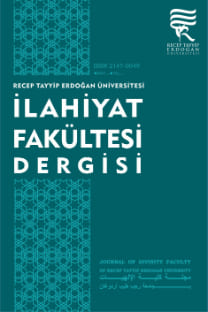Buhârî’nin Cerh-Ta‘dîl Metodu
Hicrî ikinci asır sistematik dönem cerh-ta‘dîl ilmi, hicrî üçüncü asırda Buhârî’nin (ö. 256/870) içerisinde bulunduğu tabaka ile devam etmiştir. Buhârî bu alanda et-Târîhu’l-kebîr, et-Târîhu’l-evsat ve ed-Duafau’s-sağîr adlı eserleriyle önemli bir münekkittir. Bu çalışmada Buhârî’nin otorite olduğu bir diğer alan olan cerh-ta‘dîl ilmindeki metodu incelenmiştir. Araştırmanın konusu, önemi, kaynakları ve yöntemine dair verilen bilgilerin yer aldığı girişten sonra birinci bölümde Buhârî’nin ilmî şahsiyeti ve ricâl ilmindeki yerine temas edilmiştir. Münekkitlerin adâlet ve zabt açısından ricâl değerlendirmeleri, bu değerlendirmeler esnasında kullanmış oldukları lafızlar ve bunların manaları cerh-ta‘dîl ilminin omurgasını oluşturmaktadır. Bu bağlamda tezin ikinci bölümünde Buhârî’nin adâlet ve zabt açısından ricâl değerlendirmeleri ile onun bu hususta kullanmış olduğu tenkit terimleri incelenmiş, burada elde edilen verilerin değerlendirilmesiyle oluşan teorik kısmın tatbiki sahadaki sonucu için el-Câmi‘u’s-sahîh’le mukayesesi yapılarak değerlendirilen râvinin el-Câmi‘u’s-sahîh’te rivayetinin bulunup bulunmadığı araştırılmıştır. Üçüncü bölümde Buhârî’nin hicrî ilk iki asırdaki cerh-ta‘dîl ifadelerini nasıl değerlendirip aktardığı, söz konusu dönemdeki münekkitler ile Buhârî arasında yapılan karşılaştırmalar ile ortaya konulmaya çalışılmıştır. Yine Buhârî’nin ed-Duafâu’s-sağîr’i hem kendi dönemi hem de kendisinden sonraki dönem duafâ literatürü ile ricâl değerlendirmeleri ve yöntem açısından karşılaştırılmıştır. Böylece onun bu alandaki metodunun izleri sürülmüştür. Araştırma süresince tespit edilen neticelerin yer aldığı sonuç kısmıyla da çalışma tamamlanmıştır.
Anahtar Kelimeler:
Buhârî, Cerh-Ta‘dîl, Ricâl, et-Târîhu’l-kebîr, et-Târîhu’l-evsat, ed-Duafâu’s-sağîr, Metot
Bukhari’s al-Jarh al-Ta‘dil Method
The science of al-jarh al-ta‘dil in the systemathic period of the 2nd century A.H. progressed through the 3rd century A.H. with a group of scholars among whom Bukhari (died in 256 A.H. / 870 A.D.) took his place. Bukhari is an important figure in this field with his works at-Tarikh al-kabir, at-Tarikh al-awsat and ad-Dhuafa as-saghir. In this study, his method of al-jarh al-ta‘dil, on which he is regarded as an authority, was examined. The topic of the research, its importance, sources and the method are mentioned in the introduction. In the first part, the scholarly personality of Bukhari and his role for the rijal was given. The rijal evaluation of hadith narrators in terms of justice and protection, the terminology they used and their meanings are at the core of al-jarh al-ta‘dil science. In this context, in the second part of the thesis, Bukhari’s rijal and al-jarh al-ta‘dil evaluation and the terminology he used were examined. In the light of the data obtained through this process, the theoretic information was applied to the area; these data were compared to his famous work, al-Jami al-saheeh. It was searched whether there is a hadith cited from the hadith narrator in his book. In the third part, what Bukhari considered and reported relating to the al-jarh al-ta‘dil methods during the first two centuries A.H. is discussed by comparisons between Bukhari and other critics of the era. Besides, his work, ad-Dhuafa as-saghir, is compared to other dhuafa literature during and after his time in terms of rijal evaluation and methods. Thus, his trace in this field was followed. With the results determined during the study and conclusion part, the study is completed.
Keywords:
Bukhari, al-Jarh al-Ta‘dil, Rijal, at-Tarikh al-kabir, at-Tarikh al-awsat ad-Dhuafa as-saghir, Method,
___
- Referans 1
- Yayın Aralığı: Yılda 2 Sayı
- Yayıncı: Recep Tayyip Erdoğan Üniversitesi İlahiyat Fakültesi
Sayıdaki Diğer Makaleler
Postmodern Tüketim Anlayışında Dindar Yaşam Biçimleri
Ayman Shihadeh’in The Existence of God Makalesinin Türkçe Tercümesi Üzerine Bir Değerlendirme
Güneysu Sempozyumu-I Güneysu’da Dini-Sosyal-Kültürel ve Sanatsal Hayat (20-22 Ekim 2017 Rize)
Saruhan, Müfit Selim(ed.). İslâm Ahlâk Esasları ve Felsefesi. Ankara: Grafiker Yayınları, 2013.
Karaca, Faruk. Dinî Gelişim Psikolojisi. Trabzon: Eser Ofset Matbaacılık, 2016.
